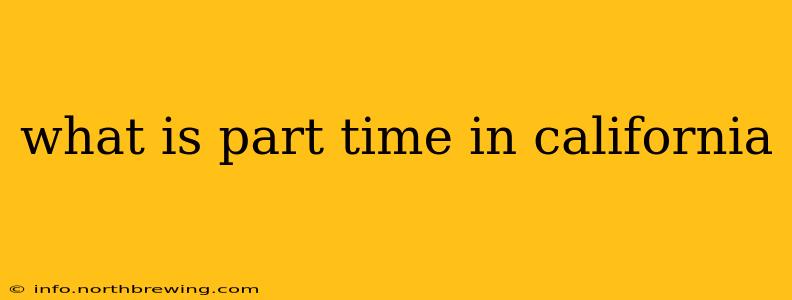California, known for its robust worker protections, has specific definitions and regulations surrounding part-time employment. This article will clarify what constitutes part-time work in California, covering key aspects like hours, benefits, and legal protections. Understanding these nuances is crucial for both employers and employees to ensure compliance and fair treatment.
How Many Hours Constitute Part-Time in California?
There's no single magic number of hours defining part-time employment in California. The state doesn't have a specific legal threshold. Instead, the classification depends heavily on the employer's policies, the employee's employment agreement, and the context of the work. An employee might be considered part-time if they consistently work fewer hours than a full-time employee at the same company. For example, if a full-time position is 40 hours per week, someone working consistently at 20 hours or less per week would likely be classified as part-time. However, it's vital to refer to your individual employment contract or company handbook for the official definition.
Do Part-Time Employees Get Benefits in California?
This is a more complex question. While California doesn't mandate benefits for all part-time employees, some benefits might be offered depending on several factors:
- Company Policy: Many employers, regardless of legal requirements, offer benefits packages – including health insurance, paid time off, and retirement plans – to part-time employees, often on a prorated basis. This is entirely at the discretion of the employer.
- Number of Hours Worked: Some companies tie benefit eligibility to the number of hours worked. For example, an employee might need to work a minimum number of hours per week or per year to qualify for certain benefits.
- Type of Employment: The specific type of position might also influence benefit eligibility. Certain roles or positions may be more likely to receive benefits even on a part-time basis.
- California's Paid Sick Leave Law: California's law mandates paid sick leave, and part-time employees are generally eligible, but the amount of accrued time is usually proportional to the hours they work.
What are the benefits for part-time workers in California?
As mentioned, benefits aren't legally guaranteed for part-time workers. However, many companies provide some benefits, and certain legal protections apply:
- Paid Sick Leave: Part-time employees accrue paid sick leave proportionally to their hours worked.
- Unemployment Insurance: Part-time workers are generally eligible for unemployment benefits if they meet other eligibility criteria.
- Workers' Compensation: Part-time employees are covered under workers' compensation insurance if injured on the job.
- Minimum Wage: Part-time employees are entitled to the same minimum wage as full-time employees.
Are Part-Time Employees Eligible for Overtime Pay in California?
Yes. California law mandates overtime pay for all non-exempt employees, regardless of whether they're part-time or full-time. Overtime is typically calculated at 1.5 times the regular hourly rate for hours worked beyond 8 hours in a workday or 40 hours in a workweek.
What is the Difference Between Part-Time and Full-Time in California?
The key distinction rests primarily on the number of hours worked and the employer's internal classification. There isn't a specific hourly threshold, but typically, a full-time employee works a standard schedule (often 40 hours per week), whereas a part-time employee works fewer hours. Full-time positions often come with more comprehensive benefits packages.
Can I Work Part-Time and Still Receive Unemployment Benefits in California?
It depends. While working part-time, you might still be eligible for partial unemployment benefits, provided your part-time earnings don't exceed a certain threshold. The specific amount of benefits will be determined based on your reduced earnings and the state's unemployment benefit calculation. You should contact the California Employment Development Department (EDD) for specific details on your eligibility.
Conclusion
Understanding part-time employment in California involves examining an employer's specific policies, the employee's contract, and the context of the work arrangement. While no definitive hourly cutoff exists, the principles of minimum wage, overtime pay, and certain aspects of benefits apply equally to part-time and full-time employees. Always refer to your employment agreement and consult with legal professionals or relevant government agencies if you have any questions or concerns regarding your specific situation.
